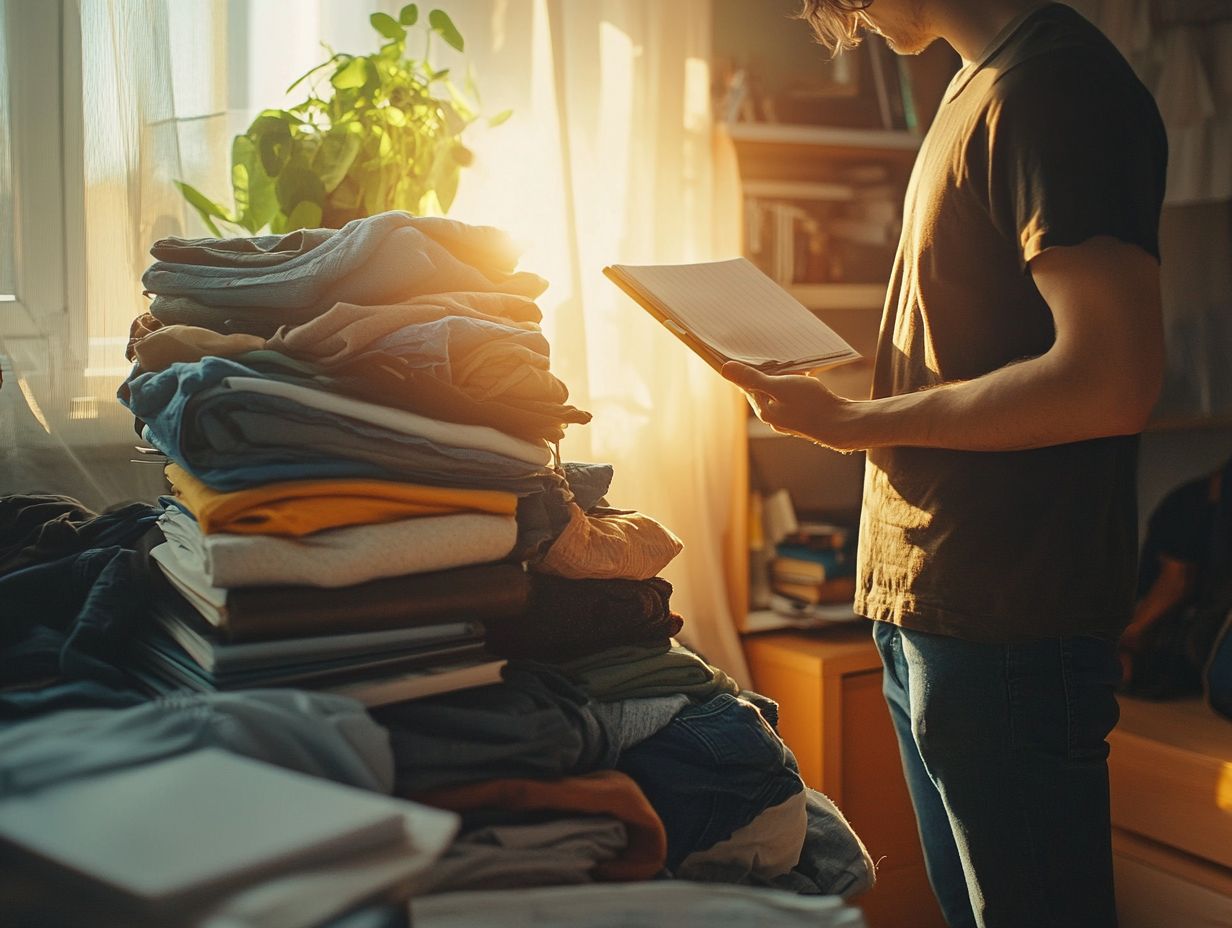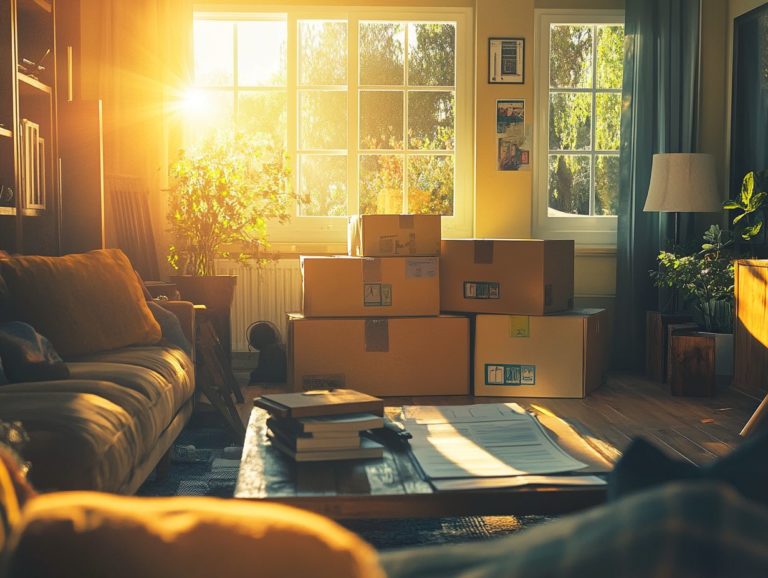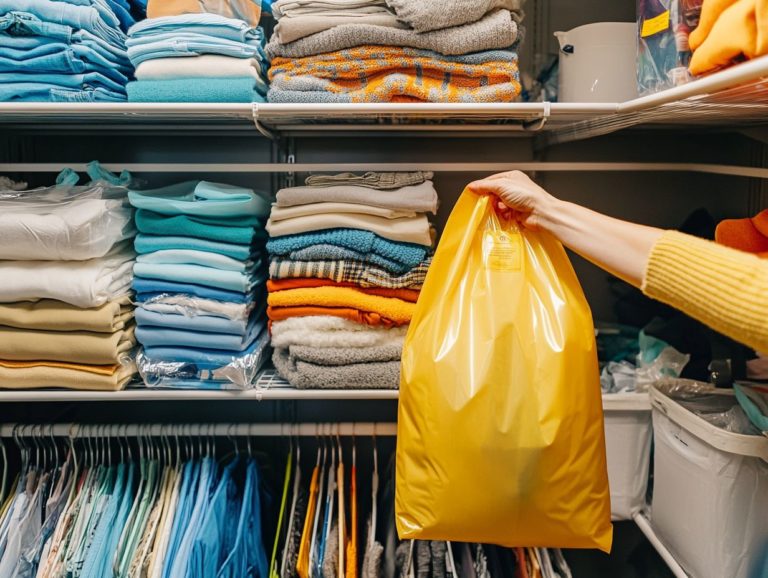10 Essential Questions to Ask When Decluttering
Decluttering may seem daunting, but it doesn t have to be an uphill battle. Ready to create a more organized and peaceful space? Let s get started!
As you face a messy closet or a chaotic garage, asking the right questions can simplify the process and empower you to make confident decisions about your belongings.
Here are ten essential decluttering questions to guide you through your decluttering journey. This will help you hold onto what truly matters while releasing the excess.
Contents
- Key Takeaways:
- 1. The Importance of Decluttering in Your Home
- 2. Understanding the Decluttering Journey
- 3. Key Decluttering Questions to Ask Yourself
- 4. Decluttering Techniques for a Tidy Home
- 5. The Impact of Physical Items on Your Mental State
- 6. Practical Steps to Declutter Your Kitchen
- 7. Emotional and Sentimental Items: A Special Case
- 8. The Role of Cleaning Maintenance in Decluttering
- 9. Finding Solutions for Expired and Damaged Items
- 10. Making the Most of Your Decluttering Experience
- Frequently Asked Questions
- What are the 10 essential questions to ask when decluttering?
- Why is it important to ask these questions when decluttering?
- How can these questions help me declutter more efficiently?
- What should I do if I am having trouble letting go of certain items?
- Should I ask these questions for every single item I own?
- Can these questions apply to digital decluttering as well?
Key Takeaways:

- Start small! Set clear goals to declutter effectively.
- Asking yourself tough questions about your items can help determine their true value and necessity.
- Don t be afraid to let go of things that no longer serve a purpose or bring joy into your life.
1. The Importance of Decluttering in Your Home
Decluttering your home is more than just organizing; it s an important process that can significantly enhance your mental state, reduce stress, and promote a minimalist lifestyle, which means living with only what you truly need. This pursuit of owning less can reshape your environment into a sanctuary that values happiness.
As you release unwanted possessions, you may discover newfound freedom from the emotional burdens they carry. Kondo s method isn t just about tidying up; it fosters a meaningful shift toward gratitude and mindfulness. When you clear out space, you create a canvas for tranquility and creativity, enabling personal growth to flourish while focusing on living simply.
Simplifying your life encourages a focus on experiences over material accumulation, ultimately enhancing your mental clarity and overall well-being. By embracing this liberating philosophy and posing minimalism questions, you can cultivate an inviting atmosphere that nurtures positive thoughts and reinforces your sense of purpose.
2. Understanding the Decluttering Journey
Embarking on a decluttering journey invites you to thoughtfully consider the emotional ties you have to various items. It prompts you to ask essential questions about their purpose in your life and whether you genuinely need them or simply wish to keep them for sentimental reasons.
As you sift through your belongings, you re likely to encounter memories woven into each object, creating a bittersweet challenge when it comes to letting go. This emotional reflection illuminates deeper insights about your priorities and values.
Understanding the distinction between needs and wants is crucial in this process. Needs are essentials that bolster your daily life, while wants often arise from fleeting desires shaped by nostalgia or societal expectations. This leads you to ask, why have these items?
By honestly assessing these distinctions, you can make more mindful choices that clear physical space and foster emotional clarity, renewing your sense of peace in your living environment.
3. Key Decluttering Questions to Ask Yourself
Asking the right decluttering questions can elevate your decision-making process, ensuring you keep only items that genuinely bring you joy and provide emotional support. This also helps you avoid regret in the future.
When you face the daunting task of decluttering, it’s crucial to ask pivotal questions like, “Does this item spark joy?” and “Have I used this in the past year?” These inquiries help you assess the necessity of each possession and serve as an emotional compass during moments of attachment. For additional motivation, consider these inspirational quotes for decluttering.
Emotional support from friends or family can enhance this experience, reminding you that it s okay to let go of things that no longer resonate. This nurturing environment fosters introspection, clearing your mind and transforming the decluttering process from a physical task into a meaningful journey.
4. Decluttering Techniques for a Tidy Home

Employing effective decluttering techniques can truly streamline your journey. You ll find that removing duplicates and unnecessary items becomes easier while receiving practical organizing tips to maintain a tidy home.
The KonMari method encourages keeping only those items that spark joy. You might also explore the four-box method, which involves sorting your belongings into categories for keeping, donating, trashing, or relocating.
This approach allows for a systematic evaluation of your possessions, making it easier to let go without feeling overwhelmed. Set a schedule for regular decluttering sessions to turn this task into a manageable routine, ensuring your spaces remain organized long after your initial effort.
By implementing these techniques, you can cultivate a clean environment and a more peaceful, focused mindset, ultimately fostering a balanced lifestyle.
5. The Impact of Physical Items on Your Mental State
Physical items can profoundly influence your mental state. The emotional weight of clutter often breeds stress and anxiety, making the pursuit of a simpler life essential for achieving peace and organization.
When your surroundings are filled with belongings, concentrating and unwinding can be challenging, creating a lingering sense of chaos. This mental clutter seeps into various areas of your life, impacting your relationships and overall happiness. Embracing simplicity and minimizing unnecessary possessions can cultivate a calming environment that fosters clarity and tranquility.
This transformative approach alleviates feelings of overwhelm and encourages you to focus on what truly matters, leading to greater fulfillment and enhanced mental well-being.
6. Practical Steps to Declutter Your Kitchen
Decluttering your kitchen can be incredibly rewarding! It allows you to streamline your space by critically evaluating your kitchen gadgets and utensils yes, even that egg separator to declutter faster.
Begin by assessing the usefulness and frequency of each gadget. Reflect on whether you ve actually used that rice cooker in the past year or if those specialty knives are gathering dust. A savvy tip is to box up items you rarely use for a month; if you don t reach for them during that time, it s a strong indication they aren t necessary.
After sorting through duplicates, consider donating or recycling the extras. To maintain an organized kitchen, establish different areas for cooking, prepping, and storing food. Make it a habit to regularly re-evaluate your kitchen tools to prevent clutter from creeping back in.
7. Emotional and Sentimental Items: A Special Case
When it comes to sentimental items, emotional ties can complicate your decluttering journey. However, navigating these feelings can empower you to identify which items genuinely add value to your life while finding ways to share or help others with the rest.
Take a moment to reflect on the specific memories tied to each item. Ask yourself, Does this item remind me of a joyful moment? Setting criteria like keeping only the items that evoke genuine happiness can streamline your decision-making process.
Consider alternatives, such as donating items to someone who might cherish them even more than you do. This act of sharing can alleviate guilt while creating space in your home.
Focusing on quality over quantity leads to a more fulfilling experience as you let go. Ultimately, this shift fosters a lighter, enriching living space that reflects your true essence.
Why wait? Start your decluttering journey today and feel the difference!
8. The Role of Cleaning Maintenance in Decluttering

Cleaning maintenance is essential for your decluttering journey. By using effective organizing tips, you save time and create a serene and orderly living space.
Regular cleaning protects against clutter. Make a routine like spending a few minutes each day to tidy up so clutter doesn t have a chance to accumulate again!
Simple strategies such as designated spaces for items, labeling containers, and frequently evaluating your belongings can greatly improve your organization. These practices keep your physical spaces uncluttered and enhance your mental clarity, allowing you to focus better and feel more in control.
The harmonious blend of cleanliness and organization cultivates a lasting atmosphere that promotes tranquility and productivity, improving your living environment.
9. Finding Solutions for Expired and Damaged Items
Deciding what to do with expired or broken items is crucial in decluttering. Assess their value, think carefully, and eliminate duplicates to create a functional living space.
Start by sorting these items into three groups: repairable, recyclable, or trash. Look closely at each item to see if a simple fix could restore it. For items you can’t save, check if they can be recycled to minimize waste instead of tossing them away. To guide your process, consider these 5 questions to ask before decluttering. Responsible disposal not only leads to a decluttered space but also brings a satisfying sense of accomplishment!
Embracing a clutter-free space enhances your quality of life, allowing for greater focus and reduced stress.
10. Making the Most of Your Decluttering Experience
Maximizing your decluttering experience starts with understanding your current lifestyle. This knowledge helps you declutter effectively, ensuring that the items you keep genuinely enhance your happiness.
Assess your daily routines and habits to pinpoint which items are essential and which are distractions. Reflecting on how your surroundings affect your mood and productivity can reveal surprising insights!
Create a regular decluttering schedule to maintain a harmonious living space. This encourages ongoing evaluation as your needs evolve. Involving family members fosters collaboration and a sense of shared responsibility, making it a fulfilling experience for everyone.
Frequently Asked Questions
What are the 10 essential questions to ask when decluttering?

The 10 essential questions to ask when decluttering can streamline your process:
- 1. Do I use this item regularly?
- 2. Does this item have sentimental value?
- 3. Can I easily replace this item if needed?
- 4. Is this item broken or damaged?
- 5. Does this item fit my current lifestyle?
- 6. Have I used this item in the past year?
- 7. Does this item serve a specific purpose or function?
- 8. Am I holding onto this item out of guilt or obligation?
- 9. Does this item bring me joy or add value to my happiness?
- 10. Can I donate or recycle this item instead of keeping it?
Why is it important to ask these questions when decluttering?
Asking these questions helps you evaluate the true importance of each item, allowing you to make intentional decisions about what to keep and what to let go of.
Start your decluttering journey today for a clearer, happier space!
How can these questions help me declutter more efficiently?
By asking these questions, you can quickly assess which items are worth keeping and which can be removed. This saves you time and energy in the decluttering process.
What should I do if I am having trouble letting go of certain items?
If you re struggling to let go of certain items, ask yourself why you re holding onto them. Are they truly necessary, or do they just hold sentimental value?
Consider if someone else might benefit from the item more than you do.
Should I ask these questions for every single item I own?
Ask these questions for every item you consider decluttering. Use your best judgment for larger or more general categories of items.
Can these questions apply to digital decluttering as well?
Absolutely! You can adapt these questions for digital decluttering too. They ll help you decide which files, apps, or emails you actually need and which ones can go.






